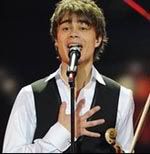
The Eurovision Song Contest finished an hour or so ago with a conclusion that we haven't seen for some years: the best song won. Alexander Rybak (right), an actor, singer-songwriter and classically-trained musician who was born in Belarus during the oucntry's last days as a member of the Soviet Union, won the prize competing for Norway where he's lived from the age of four, with a dramatic tale of obsession with a former lover from a stormy relationship called Fairytale.
The once-revered Song Contest changed its voting system from excusively professional juries to public voting by telephone in 1998 because of cynicism about countries voting not for songs but for other countries that they were allied to or even feared; and the Telegraph's Chris Hastings reported allegations that Spanish dictator General Franco bribed juries to vote for Spain in 1968, resulting in British superstar Cliff Richard coming second with Congratulations.
However, the voting change resulted in the situation whereby votes were allocated for almost every reason other than the song worsening. Terry Wogan, who had presented British TV coverage for the Contest from 1980 and is known Europe-wide as a song contest institution, decided he'd had
 enough in 2008 when Russia won through politically-skewed voting by countries that were, as he indicated, placating "the biggest boy in the playground". He moved after Eurovision boss Bjorn Erichsen labelled his famously acerbic commentary as the problem with Eurovision rather than the voting. (Erichsen is a Dane: when his country hosted the Contest in 2001, there were comlaints at a diplomatic level for his referring to hosts Soren Pilmark and Natasja Crone-Back as "Doctor Death and the tooth fairy".) But Wogan has a talent for puncturing egos which exist at rarefied levels where ordinary people are rarely given a voice, and his falling on his sword was undoubtedly a factor in the voting change.
enough in 2008 when Russia won through politically-skewed voting by countries that were, as he indicated, placating "the biggest boy in the playground". He moved after Eurovision boss Bjorn Erichsen labelled his famously acerbic commentary as the problem with Eurovision rather than the voting. (Erichsen is a Dane: when his country hosted the Contest in 2001, there were comlaints at a diplomatic level for his referring to hosts Soren Pilmark and Natasja Crone-Back as "Doctor Death and the tooth fairy".) But Wogan has a talent for puncturing egos which exist at rarefied levels where ordinary people are rarely given a voice, and his falling on his sword was undoubtedly a factor in the voting change.Cirque de Soleil's surreal opening act upheld Eurovision's legendary reputation for strangeness, but once the music started, it was clear - with only a few exceptions, like Lithuania's Sasha Son, who dressed like Frank Sinatra but sang like Gareth Gates - that the song and its performance were the priorities.
When Sweden's Malena Erman came on I groaned something like "here comes rentablonde", but she sang like an angel whose high-notes threatened to crack the TV screen. I was hooked.
Israel had two vocalists, one Jewish and the other Arab, sing There Must be Another Way which, though worthy, expressed the sort of fuzzy sentiment that things will all work out well if we think nice thoughts that can sometimes infest Eurovision; Malta and Denmark sung on similar themes, although perhaps Israelis have more impetus to reflect on what they were singing.
A couple of stars who were well-known in Britain turned up: Lord Andrew Lloy
 d Webber, of Jesus Christ Superstar, Evita and Cats fame played piano on the song he wrote for the UK's Jade Ewen, and on Gemany's entry, which could have been lifted from a 1930's Berlin nightclub and was performed by Alex Swings! Oscar Sings! (honest), Ditta von Teese did a short burlesque routine, characteristically blending the sensual with the cerebral in a way that showed up Ukraine's Svetlana Loboda as a tacky stag-night artiste, performing moves that I think should have been reviewed in the light of the fact that children (like ours) are traditionally allowed to stay up for Eurovision. (I refute claims that I brightened up when von Teese appeared on stage.)
d Webber, of Jesus Christ Superstar, Evita and Cats fame played piano on the song he wrote for the UK's Jade Ewen, and on Gemany's entry, which could have been lifted from a 1930's Berlin nightclub and was performed by Alex Swings! Oscar Sings! (honest), Ditta von Teese did a short burlesque routine, characteristically blending the sensual with the cerebral in a way that showed up Ukraine's Svetlana Loboda as a tacky stag-night artiste, performing moves that I think should have been reviewed in the light of the fact that children (like ours) are traditionally allowed to stay up for Eurovision. (I refute claims that I brightened up when von Teese appeared on stage.)Russia's entry was a well-written and intelligently-staged song about how a mother's advice to her daughter is found to be true after it's ignored. As Ken Bruce, commentating for BBC Radio ", observed, Anastasiya Prikhodko sin't a proponent of the "leave 'em laughing" school, but the ballad's huge in the host country, where artists can raise the recounting of misery to the level of high art. It was good to see some traditional outfits, for example in Moldova's entry, traditional-style folk music, as in Portugal's, and the odd bit of reassuring vintage Eurovision cheese - like the Blue Man dancing in Albania's entry. On the other hand, all that was missing from Romania's entry "The Balkan Girls like to party..." was Lembit Opik. Turkey produced belly-dancers, as usual, which was a salutory reminder that not all women living in Islamic countries have yet been stitched into burqas.
The voting was expemplary, something that wouldn't have happened without Terry Wogan's sacrifice. New presenter Graham Norton proved himself equal to the job, considering that he was running to stand still in the first place through merely not being Wogan. But I was nonplussed that, while Wogan felt no need to refer to his sexual orientation in 30 Eurovisions, Norton professed himself taken with Ukraine's backing dancers, sub-Chippendales headbanging in Roman helmets.
If certain elected British members had taken note of how wide disaffection with Eurovision had forced changes in voting at the highest levels, they might have considered the effects abuse of expenses would have on the electorate once the evidence inevitably appeared in the public domain. Perhaps the effect of dissatisfaction on this European institution indicates that public demands on their representatives will not be limited by British shores.
But, on the night, it was good to see several sets of laughing-gear in their natural state, unhomogenised orthodontically; and also what Maxima refers to as "real women", not the stick-people belched out by diet boot-camps. And another bonus - nobody got nul points.











Thank you for this overview of the Eurovision song contest. Having witnessed it many years ago, deciding that countries only vote for places they like, as you suggest, I gave up on it. Katie Boyle was wonderful but I do have an aversion to Wogan (sorry).
ReplyDeleteI can't help but wonder if the combination of being born in Belarus and representing Norway helped Alexander Rybak span the east west divide, to win. I agree with the result; it was a cheerful, though sentimental, song. Given that so many non-indigenous singers perform songs, in English and written but by non-English speakers, why it is that Britain cannot surge ahead and write a winning entry with one hand tied behind its metaphorical back!
To be honest, I joined the programme at the voting stage and so was pleased to have the various recaps of performances and to see that extraordinary Argentinean aerialist group, who I saw live in London some years ago performing a smaller scale, though similar act, using water; much of which went over the audience on that occasion!
I was getting more and more tired of Eurovision, but have had some more faith restored in it after last night. But I agree with what you say - being born in the former USSR probably didn't do Rybak any harm in Moscow!
ReplyDeleteMy pre-teen daughter and her friend, who was over for a sleepover, were rapt at the voting, which was a joy to see after they fidgeted and chattered through the songs.
When you say you witnessed one of the Contests, do you mean that you were actually at one?